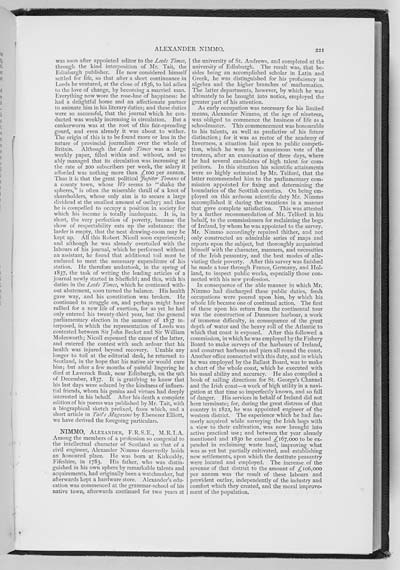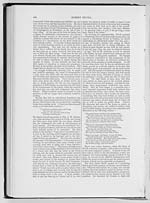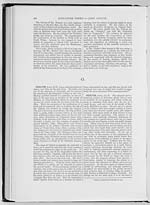221
was soon after appointed editor to the Leeds Times,
through the kind interposition of Mr. Tait, the
Edinburgh publisher. He now considered himself
settled for life, so that after a short continuance in
Leeds he ventured, at the close of 1836, to bid adieu
to the love of change, by becoming a married man.
Everything now wore the rose-hue of happiness: he
had a delightful home and an affectionate partner
to animate him in his literary duties; and these duties
were so successful, that the journal which he con-
ducted was weekly increasing in circulation. But a
cankerworm was at the root of this fair-spreading
gourd, and even already it was about to wither.
The origin of this is to be found more or less in the
nature of provincial journalism over the whole of
Britain. Although the Leeds Times was a large
weekly paper, filled within and without, and so
ably managed that its circulation was increasing at
the rate of 200 subscribers per week, the salary it
afforded was nothing more than �100 per annum.
Thus it is that the great political Jupiter Tonans of
a county town, whose We seems to "shake the
spheres," is often the miserable thrall of a knot of
shareholders, whose only aim is to secure a large
dividend at the smallest amount of outlay; and thus
he is compelled to occupy a position in society for
which his income is totally inadequate. It is, in
short, the very perfection of poverty, because the
show of respectability eats up the substance: the
larder is empty, that the neat drawing-room may be
kept up. All this Robert Nicoll soon experienced;
and although he was already overtoiled with the
labours of his journal, which he performed without
an assistant, he found that additional toil must be
endured to meet the necessary expenditure of his
station. He therefore undertook, in the spring of
1837, the task of writing the leading articles of a
journal newly started in Sheffield; and this, with his
duties in the Leeds Times, which he continued with-
out abatement, soon turned the balance. His health
gave way, and his constitution was broken. He
continued to struggle on, and perhaps might have
rallied for a new life of exertion, for as yet he had
only entered his twenty-third year, but the general
parliamentary election in the summer of 1837 in-
terposed, in which the representation of Leeds was
contested between Sir John Becket and Sir William
Molesworth; Nicoll espoused the cause of the latter,
and entered the contest with such ardour that his
health was injured beyond recovery. Unable any
longer to toil at the editorial desk, he returned to
Scotland, in the hope that his native air would cure
him; but after a few months of painful lingering he
died at Laverock Bank, near Edinburgh, on the 9th
of December, 1837. It is gratifying to know that
his last days were solaced by the kindness of influen-
tial friends, whom his genius and virtues had deeply
interested in his behalf. After his death a complete
edition of his poems was published by Mr. Tait, with
a biographical sketch prefixed, from which, and a
short article in Taifs Magazine by Ebenezer Elliott,
we have derived the foregoing particulars.
NIMMO, ALEXANDER, F.R.S.E., M.R.I.A.
Among the members of a profession so congenial to
the intellectual character of Scotland as that of a
civil engineer, Alexander Nimmo deservedly holds
an honoured place. He was born at Kirkcaldy,
Fifeshire, in 1783. His father, who was distin-
guished in his own sphere by remarkable talents and
acquirements, had originally been a watchmaker, but
afterwards kept a hardware store. Alexander's edu-
cation was commenced at the grammar-school of his
native town, afterwards continued for two years at
the university of St. Andrews, and completed at the
university of Edinburgh. The result was, that be-
sides being an accomplished scholar in Latin and
Greek, he was distinguished for his proficiency in
algebra and the higher branches of mathematics.
The latter departments, however, by which he was
ultimately to be brought into notice, employed the
greater part of his attention.
As early occupation was necessary for his limited
means, Alexander Nimmo, at the age of nineteen,
was obliged to commence the business of life as a
schoolmaster. This commencement was honourable
to his talents, as well as predictive of his future
distinction; for it was as rector of the academy of
Inverness, a situation laid open to public competi-
tion, which he won by a unanimous vote of the
trustees, after an examination of three days, where
he had several candidates of high talent for com-
petitors. In this situation his scientific attainments
were so highly estimated by Mr. Telford, that the
latter recommended him to the parliamentary com-
mission appointed for fixing and determining the
boundaries of the Scottish counties. On being em-
ployed on this arduous scientific duty Mr. Nimmo
accomplished it during the vacations in a manner
that gave complete satisfaction. This was attested
by a further recommendation of Mr. Telford in his
behalf, to the commissioners for reclaiming the bogs
of Ireland, by whom he was appointed to the survey.
Mr. Nimmo accordingly repaired thither, and not
only constructed an admirable series of maps and
reports upon the subject, but thoroughly acquainted
himself with the character, manners, and necessities
of the Irish peasantry, and the best modes of alle-
viating their poverty. After this survey was finished
he made a tour through France, Germany, and Hol-
land, to inspect public works, especially those con-
nected with his new profession.
In consequence of the able manner in which Mr.
Nimmo had discharged these public duties, fresh
occupations were poured upon him, by which his
whole life became one of continual action. The first
of these upon his return from the continental tour
was the construction of Dunmore harbour, a work
of immense difficulty, in consequence of the great
depth of water and the heavy roll of the Atlantic to
which that coast is exposed. After this followed a
commission, in which he was employed by the Fishery
Board to make surveys of the harbours of Ireland,
and construct harbours and piers all round the coast.
Another office connected with this duty, and in which
he was employed by the Ballast Board, was to make
a chart of the whole coast, which he executed with
his usual ability and accuracy. He also compiled a
book of sailing directions for St. George's Channel
and the Irish coast�a work of high utility in a navi-
gation at that time so imperfectly known, and so full
of danger. His services in behalf of Ireland did not
here terminate; for, during the great distress of that
country in 1822, he was appointed engineer of the
western district. The experience which he had for-
merly acquired while surveying the Irish bogs with
a view to their cultivation, was now brought into
active practical use; and between the year already
mentioned and 1830 he caused �167,000 to be ex-
pended in reclaiming waste land, improving what
was as yet but partially cultivated, and establishing
new settlements, upon which the destitute peasantry
were located and employed. The increase of the
revenue of that district to the amount of �"106,000
per annum was the result of these labours and
provident outlay, independently of the industry and
comfort which they created, and the moral improve-
ment of the population.

![]() Universal Viewer |
Universal Viewer | ![]() Mirador |
Large image | Transcription
Mirador |
Large image | Transcription
![]()

